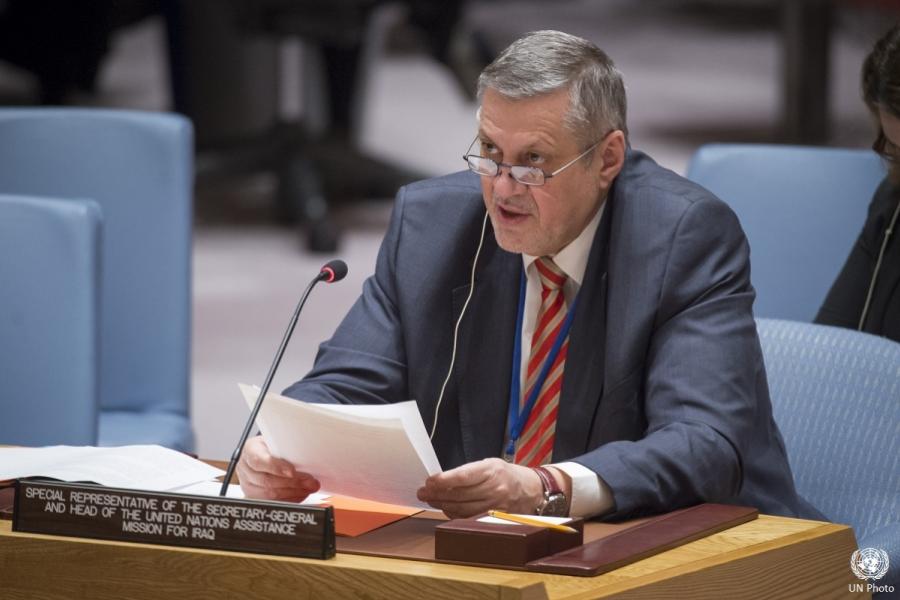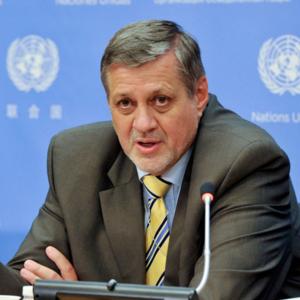Briefing to the Security Council by SRSG for Iraq Ján Kubiš New York, 20 February 2018 [AS DELIVERED] | BTSC
Mr. President,

This Security Council meeting takes place just days after the Iraq Reconstruction Conference, so generously co-hosted by H. H. Emir of Kuwait, thus showing once again his and his country’s commitment to the humanitarian, peace and development cause in the region and in the world.
The conference was attended by over seventy member states and international organizations and 2,000 private sector companies. It mobilized nearly USD 30 billion to support reconstruction.
This massive regional and international response is an extraordinary proof of continuous solidarity with and confidence in the Government and in the people of Iraq.
The Secretary-General stated in his concluding remarks “In a world where unfortunately good news is scarce, and in the region where unfortunately we see many situations getting worse, the fact that Iraq is on the right track and the fact that the international community has shown its confidence in Iraq is a very important piece of good news.”
Mr. President,
As the Security Forces continue to clear out remnants of Da’esh, Iraq is increasingly focusing on the upcoming parliamentary elections on 12 May 2018.
Many of the Iraqi political forces decided to form cross-sectarian, cross-ethnic coalitions across the political spectrum. It is indeed essential that the elections will confirm the vision of Iraqis working together across the sectarian and ethnic divides in pursuing the needed political, economic and social reforms based on the principles of citizenship with equal rights, justice and opportunity for all and good governance, void of the compromised quota system and corruption. Only a new government, based on such an approach will guarantee the future of Iraq as a united, democratic, fully sovereign and independent federal state, as a factor of stability, cooperation and prosperity for its people and for the region.
Mr. President,
The Independent High Electoral Commission has steadily continued its preparations for the parliamentary elections. The Commission has registered 205 political parties; and 27 political coalitions are approved to contest the elections. Yet, a number of challenges remain.
The voluntary and dignified return of IDPs under conditions of safety and security is an issue critical for the success and credibility of the elections. In the months ahead, the Government expects that as many as two million of the 2.5 million who are still displaced will return home. I am also encouraged by the decision of the Government to establish voluntary return committees, with humanitarian representatives, in each Governorate to oversee the return process.
Providing a security environment by the Iraqi Security Forces which enables voters to exercise their right to vote in safety, free from terror, fear or intimidation, is an overriding concern. Although Da'esh's so-called caliphate has been defeated, the terrorist organisation and its sleeper cells, including among IDPs, continues to pose a threat. On 18 February, in the course of counter terrorism operations in Hawija and surrounding areas, a special force from the Popular Mobilisation Forces was ambushed and over 20 fighters were martyred.
In addition, the new electronic ballot counting system, including the customization and development of the software for results tabulation continues to be a work in progress and requires accelerated support, including from the UN and other international partners, in order to ensure the envisaged enhanced integrity and credibility of the elections.
Observation of the elections, both domestic and international, will be a vital component in fostering credibility and acceptance of the results. I strongly urge domestic observer groups, as well as the international community, to participate in the observation of the elections, and the international community to provide the necessary support.
Credible and acceptable elections with high voter turnout, including in the liberated areas and in the Kurdistan region, and with specific measures to facilitate women’s participation, will empower the new government to implement reforms, improve accountability and promote inclusiveness and reconciliation between different components and groups in Iraq.
Mr. President,
I am encouraged by the recent positive developments in relations between Baghdad and Erbil. Prime Minister Abadi these days confirmed that the federal and regional Governments are in the final stages of negotiations as regards some concrete areas that would address urgent needs and concerns of the people of the region, starting with payment of salaries and re-opening of the airports in Erbil and Sulaymaniyah. Such steps are urgently needed.
Mr. President,
I commend the Iraqi federal Government and the Kurdistan Regional Government for their concerted efforts and strong coordination towards the implementation of the national action plan on women, peace and security. With elections looming, we urge Iraqi senior political leaders to broaden women’s political space and appoint them in leadership positions within political parties, as well as to ensure their meaningful participation in all electoral processes including participating in negotiations towards the government formation after the national elections.
Mr. President,
I welcome the government’s willingness to work with the United Nations Country Taskforce on Monitoring and Reporting to develop an action plan to address violations committed against children in times of conflict. To this end, Prime Minister Abadi has endorsed the establishment of the National Inter-Ministerial Senior Committee for Monitoring and Reporting on children affected by the armed conflict.
Mr. President,
UNDP’s Funding Facility for Stabilization has continued to scale-up its efforts to stabilise newly liberated areas of Iraq. FFS is now cleared to work in 31 of the more than 40 cities and districts which have been liberated by Iraqi Security Forces. Since we last reported to the Security Council, 360 projects have either been completed or are under development bringing the total number of stabilization projects to 1,887. In Mosul alone, nearly 600 stabilization projects are underway.
Mr. President,
Despite strong support demonstrated by Kuwait, and commitment to their international and humanitarian obligation shown by Iraq, full normalization of relations will only take place once all outstanding issues concerning Kuwaiti Missing Persons and Property have been resolved.
The Government of Iraq, particularly its Ministry of Defence, are making proactive efforts to reanimate the search for missing Kuwaiti persons. I deeply regret that the last thirteen years have not yielded tangible results.
During the last session of the Tripartite mechanism, which took place on 6th February in Kuwait, Tripartite members highly acknowledged the ICRC review project that would serve to streamline and prioritise work, re-orient activities, and guide the mechanism.
I would like to take this opportunity to call upon the international community to consider how it can support the search for the missing Kuwaiti persons, including through procurement of field equipment and provision of forensic, DNA, and anthropological training and capacity-building for the Iraqi and Kuwaiti technical teams. Those Member States in possession of satellite imagery from 1990-1991 are particularly encouraged to come forward and provide analysis and information to the Government of Iraq that could assist in identification of burial locations.
I also reiterate my call for Iraq and Kuwait to come to an agreement on the swift repatriation of located Kuwaiti academic textbooks that have been awaiting official handover for over a year.
Mr. President,
Before concluding allow me to use the opportunity to thank my outgoing Deputy and at the same time RR/RC/HC Ms. Lise Grande for the truly outstanding work in her over three years in Iraq. When we praise major achievements in the areas of stabilization, when we applaud hard work and significant results in the humanitarian field including in civilian-military cooperation that so successfully worked for the protection and benefit of the affected civilian population notably during the Mosul liberation campaign we need first of all to recognise the leadership and achievements of DSRSG Lise Grande that together with her colleagues made it happen.
Speech by


